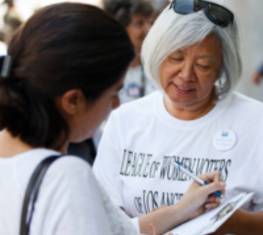Press Releases
Press Releases
A federal judge ruled in Arizonans for Fair Representation v. Hobbs that Arizona cannot permit online signature collection for ballot petitions.
A federal judge has ruled in League of Women Voters of Virginia, et al. v. Virginia State Board of Elections that the witness requirement for absentee ballots is waived for the state’s June primary.
The League of Women Voters of North Dakota filed a lawsuit asking the United States District Court of North Dakota to provide relief for voters from the state’s burdensome signature match policy.
VOTE411, the League of Women Voters’ one-stop-shop for nonpartisan election information, this week was announced as a Webby Awards Nominee.
Afederal appeals court panel ruled in the League of Women Voters of Kansas case, Fish v. Schwab (previously Fish v. Kobach), that Kansas voters do not need to provide proof of citizenship when registering to vote.
The Virginia attorney general and the League of Women Voters of Virginia reached an agreement in League of Women Voters, et al. v. Virginia State Board of Elections, to remove the witness requirement for signatures on absentee ballots.
The League of Women Voters of Arizona filed an amicus brief in Arizonans for Fair Representation v. Hobbs, asking the state to permit online signature collection for ballot petitions via the state’s online system candidates for federal and state office use to collect signatures for nominating petitions.
The League of Women Voters of North Carolina filed a motion to intervene in a lawsuit that would remove individuals en mass from voter rolls in Mecklenburg and Guilford counties.
With the increased demand for absentee ballots due to COVID-19, the witness requirement presents a burden for voters’ health and safety.
A federal court judge ruled that Texas voters may cite COVID-19 in mail-in ballot request forms as a “disability” requirement. The League of Women Voters of Texas and the Austin Area asked the court to rule that the definition of “disability” in Texas law encompasses all registered voters, since the coronavirus prevents voters from appearing at a polling location without a real likelihood of injuring their health.
Sign Up For Email
Keep up with the League. Receive emails to your inbox!
Donate to support our work
to empower voters and defend democracy.





